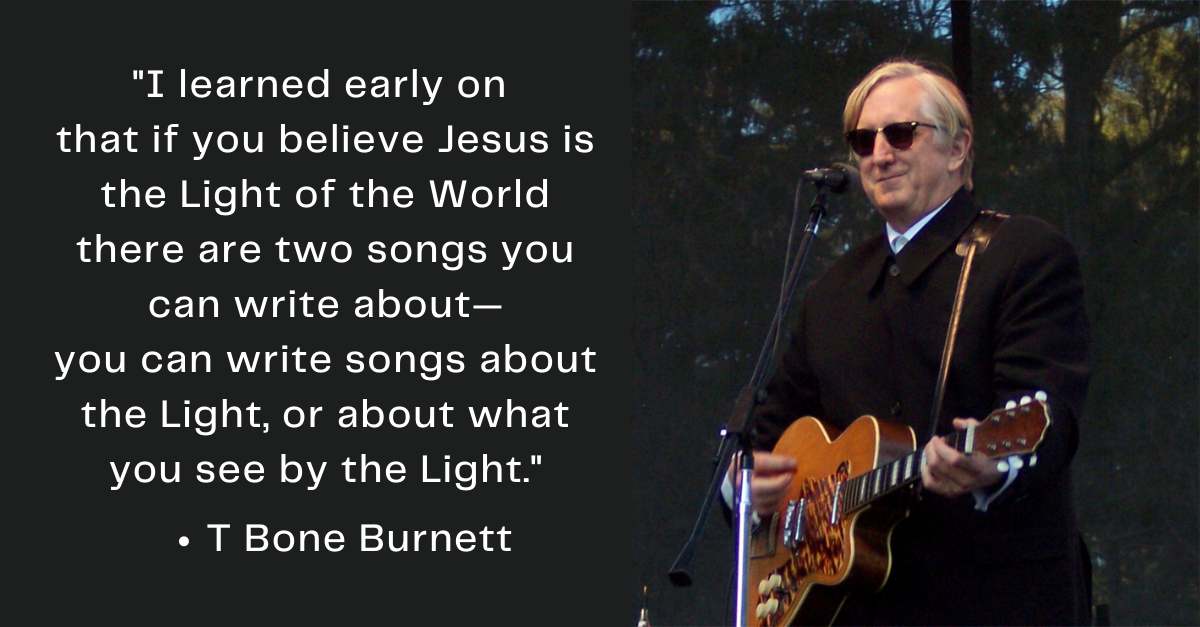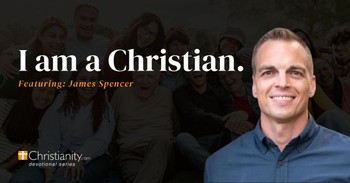T Bone Burnett has a unique place in Christian circles. In the 1970s, he was inaccurately described as leading Bob Dylan to faith, and some expected him to become “the Christian Bob Dylan.”
While faith informs Burnett’s songwriting—he’s talked about C.S. Lewis and G.K. Chesterton inspiring how he writes lyrics—he has never worked in Contemporary Christian Music. Instead, he has become one of the most sought-after music producers, producing music for artists ranging from Roy Orbison to Lisa Marie Presley. He’s also written music for True Detective and multiple Coen Brothers movies. As HM contributor Dan MacIntosh observes, “rather than infiltrating the contemporary Christian music world, he’s allowed intelligent and adventurous Christians to discover him by themselves.”
So what do we see when we discover Burnett’s work?
10 Key Events in T. Bone Burnett’s Life
1. Joseph Henry Burnett III was born in St. Louis, Missouri, on January 14, 1948. He was raised Episcopalian, and his grandfather served as Georgia’s secretary for the Southern Baptist Convention for 28 years.
2. Raised in Fort Worth, Texas, Burnett took the nickname “T-Bone.” At age 11, after hearing a Fellowship of Christian Athletes’ altar call at Ozark Mountain Boys’ Camp, Burnett decided to be confirmed. In a 1993 interview with Sharon Gallagher, he referred to this as his conversion.
3. In 1964, just 17 years old and still in high school student, Burnett began producing music at Fort Worth’s Sound City recording studio. His early singles, like “Free Soul,” appeared in the Fort Worth Teen Scene! anthology.
4. In 1975, Bob Dylan selected Burnett for the Rolling Thunder Revue. Burnett denied rumors that he converted Dylan to Christianity during the tour but observed many musicians got involved in Christianity during that period: “Probably about 15 people out of that Rolling Thunder tour started going to church, or going back to church.”
5. Burnett attended the Vineyard church during or just after the Rolling Thunder Revue tour ended in 1976. Around this time, he had a spiritual reawakening some sources reported as his conversion. He described it to Gallagher as more of a reconnecting with God: “when I was 11, my needs were very different from when I was 28 or so. At different times in my life, I met God from a different point of view.”
6. In 1980, Burnett released Truth Decay, his first solo album. Critics compared him to Bruce Cockburn and Bob Dylan, many predicting he would achieve great fame. After releasing two more albums and two EPs in the 1980s, Burnett focused on producing others’ music with the occasional solo album.
7. In the mid-1980s, music producer Tom Willard introduced Burnett to Leslie Phillips, then Contemporary Christian Music’s number two female artist. Burnett recalled Phillips was in a soul-searching period, “going through a lot of the issues that I had resolved for myself probably 10 years before.” Burnett produced The Turning, Phillips’ final album before leaving Contemporary Christian Music to become an independent artist. They married and had a daughter before divorcing in 2004.
8. In 1998, Burnett produced the soundtrack for The Big Lebowski, the first of several collaborations with the Coen Brothers. He would later win greater acclaim for producing the soundtrack to Where Brother Where Art Thou? which revived listeners’ interest in roots music.
9. In 2007, Burnett produced the highly acclaimed album Raising Sand, combining Zeppelin singer Robert Plant and bluegrass singer Alison Krauss.
10. In 2019, Burnett gave a keynote address at South by Southwest, urging audiences to consider the dangers of artificial intelligence and Silicon Valley tech companies’ tactics for artists.
10 T Bone Burnett Quotes on Faith and Music
1. “I try to put my beliefs and my feelings about things in my songs and not talk down to people and preach to people necessarily.” — 1982 interview with Bobbie Wygant
2. “My songs deal with political-type issues but not in political terms. They aren’t overtly political because I don’t think there are political solutions to the problems of humankind. Decisions our leaders make definitely help, but our dilemma is a spiritual one.” — quoted in The Criminal Under My Own Hat review by Dan Ouellette
3. “I learned early on that if you believe Jesus is the Light of the World there are two songs you can write about—you can write songs about the Light, or about what you see by the Light.” — interview with Bill Flanagan, Written in My Soul
4. “… theology is what C.S. Lewis called a road map, which of course is a good thing to have. But I’ve been finding much more inspiration in a lot of other places, like in Pablo Neruda and in people who look at life in its largeness. Theologians often seem to look at life and try to shrink it to fit in some system.” — Sharon Gallagher interview in Radix volume 21 issue 3
5. “It seems to me that religious people are entering cultural debates these days motivated by fear and larceny. C.S. Lewis said people who are in love are always willing to give up power, while people who are afraid are always trying to amass power.” — November 1994 Sojourners interview with David Batstone
6. “A lot of ‘Christian’ artists make it seem as though all they do is sit around and read the Bible all day long and go to church. They give the impression that they never go to a baseball game or play with the dog. That’s demeaning.” — August/September 1984 The Wittenburg Door interview
7. “I tend to think it’s not a good idea to try to bring the kingdom of God to earth. It’s not a good idea to try to codify everything either, or as G.K. Chesterton said, ‘Logic is the natural enemy of poetry. The poet wants to get his head into heaven, while the logician wants to get heaven into his head—until his head cracks.’” — Gallagher interview
8. “I lean close in sentiment to many evangelicals… but I don’t find myself needing to go out and find people to tell about Jesus. My ministry is to make doubters out of unbelievers.” — February 1983 Contemporary Christian Music interview
9. “I didn’t get a clear picture of anything from the leaders in my church, except for my Sunday School teacher in about the sixth grade… The thing I really loved—which has been a great comfort to me my whole life—was when she said, ‘The will of God is like a rubber band that you’re attached to. It goes from one spot to another. As long as you walk along this road, the band will let you go as long as you want to, but God will bring you back at some point.’” — Gallagher interview
10. “Art has to be irresistible. It can’t be pedantic or instruct or preach. I certainly have been accused of preaching in the past, and I hope I’ve overcome any tendencies I’ve had in that direction. More than preaching I’ve been raising the alarm. Hopefully I’ve gotten good enough at it so that I’m not preaching, but just ringing the bell.” — 2019 New York Times interview with John Pareles

What Can Christian Musicians Learn from T Bone Burnett
1. Avoid the hype. While Burnett has experienced great success, he has consistently pushed against attempts to label him “the next great….” Instead, he has emphasized doing the work well and having an “integrated” life where his projects connect well to his other interests.
2. Respect the audience. Burnett has often spoken about never doing “anything that’s talking down to, or in any way jacking with, the audience.” Sometimes his music has been complex, but he’s never condescended to listeners.
3. Sometimes, art must talk about dark subjects. Burnett’s own music tends to talk about dark subjects. However, many reviewers have noted he writes about broken people in a way that gives them dignity, treating them as “the least of these” that God loves.
4. Care for the people you work with. When asked why so many musicians seek him out, Burnett replied, “I have to say it’s all about love and it’s all about community, it really is. I try to only work with people I really love and that really love me.”
5. Study your craft. Burnett doesn’t just like making music. He has studied the music-making process and its history and supported ventures to create better recording technology. He has lived out the idea of honoring one’s God-given gifts by using them well.
6. Invest in new talent. Burnett has not only produced music; he also mentored various musicians and producers. His protégé Joe Henry recalled, “He generously invited me into his circle and began to treat me like a peer, which had tremendous value to me and still does.”
7. Keep learning new things. Burnett shares many interests in interviews—from American music to Marshall McLuhan. He has also been willing to try many things, even making a musical with Stephen King. His willingness to keep learning and experimenting has kept him fresh and aware when many musicians have lost their way.
8. Don’t be afraid to tell the unpopular truth. Burnett has routinely criticized organizations or leaders who make hypocritical choices or promote poor business practices. In the 1990s, he criticized Christian leaders for behaving like Pharisees. More recently, he has been vocal about digital distribution models where artists barely profit from streaming apps.
9. Pursue solutions to problems. While Burnett has criticized many things, he’s also sought ways to improve things. For example, he’s talked about digital music damaging sound quality and developed Ionic Originals, which combines CD and vinyl technology for the best possible sound quality.
10. Seek fruitful long-term collaborators. Burnett has sought out good people to work with and worked with them over time. He has worked on multiple Coen Brothers movies, most recently The Ballad of Buster Scruggs. Since touring with Bob Dylan in the 1970s, he has worked with Dylan at least twice: producing a collection of long-forgotten Dylan songs and re-recording “Blowin’ in the Wind” as the first Ionic Original.
10 T Bone Burnett Albums to Listen To
When Burnett releases his own music, not much of it sounds like what plays on Christian radio. Like Dylan, his music often makes the most sense as short story collections about complex people, often doing things they shouldn’t. Sometimes the songs become blistering satire, like the Invisible Light albums’ songs criticizing Big Tech.
However, as reviewer Regan McMahon observes, “As bitter as some of his songs appear, Burnett is doing more than pointing fingers at other sinners; he’s struggling with the same issues that face all of us, fighting moral corruption with faith and hope.”
Here are some of Burnett’s best albums, including his work with the short-lived Alpha Band of the 1970s.
2. Truth Decay
9. The Invisible Light: Acoustic Space
To learn more about these albums and his other music, read Lloyd Sachs’ book T Bone Burnett: A Life in Pursuit.
If you enjoyed this article, you may enjoy the following articles about Christian musicians:
What You Should Know about Rich Mullins
Was Mark Heard Contemporary Christian Music’s Best Songwriter?
Remembering Contemporary Christian Music Pioneer Keith Green
Was Michael Been the 80s Most Underrated Christian Rocker?
How Did Larry Norman Become the Father of Christian Rock?
Thanks to the Wittenburg Door and Radix Magazine for providing archival material.
Photo Credit: Theo Wargo/Getty Images/Staff

This article is part of our People of Christianity catalog that features the stories, meaning, and significance of well-known people from the Bible and history. Here are some of the most popular articles for knowing important figures in Christianity:
How Did the Apostle Paul Die?
Who are the Nicolaitans in Revelation?
Who Was Deborah in the Bible?
Who Was Moses in the Bible?
King Solomon's Story in the Bible
Who Was Lot's Wife in the Bible?
Who Was Jezebel in the Bible?
Who Was the Prodigal Son?








